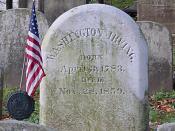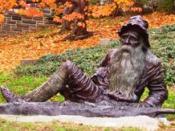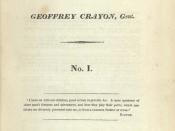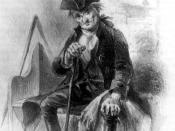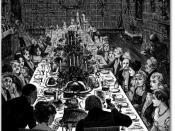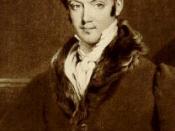Washington Irving (1783-1859) The year of Washington Irving's birth, 1783, was also the first year that England recognized the United States as a sovereign nation. His generation was left with the task of filling the boots of the larger-than-life hero George Washington. Irving eventually forged himself the title of the "Father of American Literature", but this journey was plagued with despair.
His search for freedom was not from governmental oppression, but what to do with the liberty won by his countrymen, as was the want of his entire generation. For Irving, this search consisted of three distinct phases. The first phase, starting at birth and lasting until age 33, consisted of Irving's well-off family allowing him to ramble from place to place with not many cares of his own.
Even from this relatively young age, Irving could sense an unseen conflict between the New World and Old. The absence of cultural tradition in the New World left a gap that Irving sought to fill.
Irving made his literary debut with Letters of Jonathan Oldstyle, Gent. Jonathan being a stage name for a bumptious American and Oldstyle referring to British refinement.
In 1809 Irving fell in love with Matilda Hoffman, the daughter of his employer. While Irving was writing the comical History of New York, Matilda fell ill and died of tuberculosis. Swallowed in grief, he managed to finish his story, written in the voice of Diedrich Knickerbocker.
The second phase of Irving's quest to find himself started when he went to Europe in May 1815. When a business he was a partner of crashed as a result of the end of the War of 1812, he was forced to file bankruptcy. He became very worried about making a living. He set out to writing to solve his fiscal crisis. He ended up with The Sketch Book of Geoffrey Crayon, Gent. Only four of the 34 collected stories took place in America, however two have survived as classics: "Rip Van Winkle" and "The Legend of Sleepy Hollow".
The confusion resulting from Rip's 20-year sleep is symbolic of Irving's generation's loss of orientation as a result of their new government. One day the picture of George III is on the tavern, the next day, as it seems to Rip, it is George Washington. So as it must have felt to all that experienced the change in government first hand. Rip evaded the responsibilities of the prime of his life. Just as Irving's generation must have wanted to escape the pressures of their world. Rip also detested the binding force of his wife, as Irving must have, evident because he was a life long bachelor, and portrayed wives and other "binding forces" with negative connotations often in his other works.
The success of The Sketch Book made Irving an internationally known and respected author. He became very popular and in 1829, took the identity of a diplomat. He became part of the American legislation in London and represented his people for three years.
In 1832, it was time for Irving to return to America and begin his final phase of life. He was warmly welcomed in New York and proceeded to have lunch with President Andrew Jackson before embarking on a tour of the American frontier. He published various accounts of his adventures including A Tour on the Prairies, Astoria, and Adventures of Captain Bonneville, U.S.A.
In 1835, Irving demonstrated his great commitment to America by buying property on the Hudson River. Called "Sunnyside", it was his imagined setting of "Rip Van Winkle", and a long-time favorite location for it's scenery and "pleasant atmosphere".
Irving revisited Europe once again when President John Tyler appointed him minister to Spain in 1842. He was minister only four years before returning to Sunnyside to begin a life-long awaited biography of George Washington. Life of George Washington was finally published in five volumes over five years. The last volume being printed the last months of his Irving's life.
After several months of bad health, Irving died on November 28, 1859, almost the start of the Civil War. His life connected the wars that forged our nation. Despite his fears of failure, Irving molded an identity as America's first popular professional writer.
